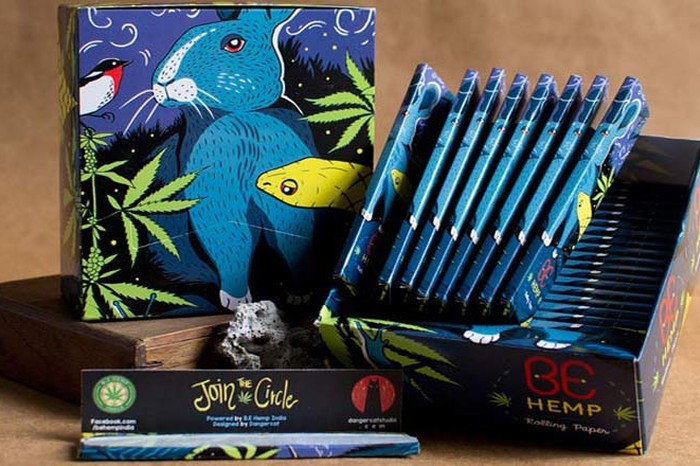If you thought cannabis is just for stoners and the Indian Himalayan states are a haven for them, think twice!
For India, cannabis has always meant more than a recreational drug. The country, especially the Northern states are aware of the cannabis’ medicinal and other related properties but commercialize it has had stigma attached.
Consumed globally, Indian cannabis is considered among the best grades considering the lower price. However, the plant can give much more than a “happy feeling’.
Industrial cannabis or Hemp can be used as a substitute for cotton and can be clubbed with natural other natural fibers like silk to produce textile. The plant can also be used to manufacture paper products and fiberglass. Additionally, according to various researchers, cannabis can be an alternative source of biofuel.
Hemp ≠ Marijuana
While hemp and marijuana are often mistaken to be same, they are not. By definition, industrial hemp is high in fiber and low in active tetrahydrocannabinol (THC), the psychoactive ingredient in marijuana that makes some cannabis varieties a valued drug.
As per to the Agricultural Marketing Research Centre, the confusion between industrial hemp and marijuana is based on the visual similarities of widely differentiated varieties of plants.
“Canada and the European Union maintain this distinction by strictly regulating the THC levels of industrial hemp, requiring it to be less than 0.3 percent, compared to THC levels of between 3 to 30 percent in marijuana,” it adds.
India’s status quo
Coming back to India, as stated by the Narcotic Drugs and Psychotropic Substances Act’s trade and consumption of cannabis’ resin (charas) and the bud (ganja), which has a higher amount of THC, is considered illegal.
While cannabis cultivation is state government’s affair and therefore, one needs to acquire cultivation license to cannabis, which is easy if one’s motive is commercial or research.
However, this hasn’t stopped Indian business from realizing the market opportunity, which is globally dominated by countries like China and Germany and is developing in the domestic market.
#Bombay Hemp Company
Incorporated in 2013 by, the Bombay Hemp Company (BoHeCo) Bombay Hemp Company is an agro-based startup that is working towards reimagining the future of Indian agriculture and sustainable living with hemp.
Recently, the company also raised about $1m from a group of investors including Ratan Tata, Chairman Emeritus, Tata Sons and Rajan Anandan, Managing Director, Google India, the company’s Co-founder SanvarOberoi said.
The company is presently working towards developing B2C apparel brand and B2B textiles. Additionally, it has also tied up with institutes like Centre Scientific and Industrial Research to understand the medical uses of industrial hemp, especially with regards to the treatment of breast cancer and disorders like epilepsy.
#B.E Hemp
The company was founded by Benson Martis and Elston Menezes in 2013 and is majorly into hemp fiber along with products such dream catchers, flip-flops, bags, wallets, belts, accessories etc. Additionally, the Bangalore-based B.E Hemp also promotes the use of edible Hemp seeds and protein for a healthier lifestyle.
Most of the company’s products are imported from Nepal and are sold via the company’s social media handles, e-commerce website and flea markets.
#Hemp Cann
Started by Bhubaneswar-based SourabAgarwal, the company is majorly into imports hemp products such as hemp protein powder, oil, tea from countries that have legalized industrial hemp, such as Canada. Agarwal is also awaiting license from State Government Of Orrisa to grow cannabis plants in the state.
“The Indian Cannabis has a decent amount of THC, which is essential to develop cancer-related medicines. We are looking to grow our plants to produce these medicines. Once we get some good results during our pilots, we will look at scaling up,” he shared with Entrepreneur India.
Moreover, Hemp Cann also manufactures hemp fabrics and some accessories.
#Hempster
Hempster is India’s first hemp care brand and established by Rohan Goud along with Rajarjun Reddy and Abhishek. The company uses cold pressed hemp seed oil to manufacture handcrafted body, face and hair care products.
Unlike another sector where the focus is on competition, the Indian hemp startups are focusing on developing the domestic market and therefore, have collaborated with each other. A perfect example of this is BoHeCo, who are busy developing their own product lines, are also major a raw-material supplier to Hempster and B.E Hemp.
If India plans to monetize this potential, they will not just create employment but an alternative revenue stream for Indian farmers along with a sustainable eco-friendly product lines.





